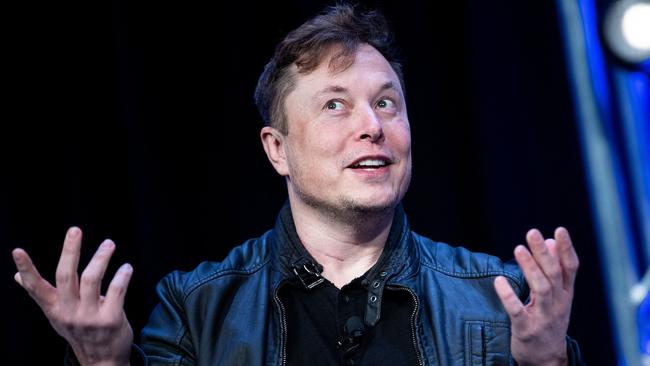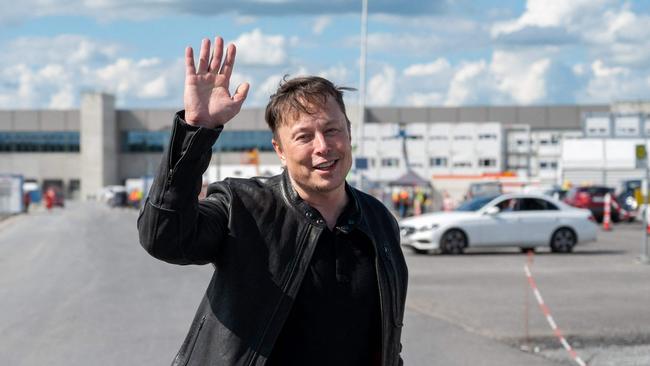Tesla failed to oversee Elon Musk’s tweets, SEC argued in letters
Regulators complained to Tesla as they struggled to enforce court orders that the CEO’s tweets be approved by company lawyers.

Securities regulators told Tesla last year that chief executive Elon Musk’s use of Twitter had twice violated a court-ordered policy requiring his tweets to be preapproved by company lawyers, according to records obtained by The Wall Street Journal.
Tesla and the Securities and Exchange Commission settled an enforcement action in 2018 alleging that Mr Musk had committed fraud by tweeting about a potential buyout of his company. Mr Musk paid $US20 million to settle that case -- Tesla also paid $US20 million -- and agreed to have his public statements on social media overseen by Tesla lawyers.
In correspondence sent to Tesla in 2019 and 2020, the SEC said tweets Mr Musk wrote about Tesla’s solar roof production volumes and its stock price hadn’t undergone the required preapproval by Tesla’s lawyers. The communications, which haven’t been previously reported, spotlight the running tension between the nation’s top corporate regulator and Mr Musk, who publicly mocked the SEC even after settling fraud claims with the agency.
The SEC told Tesla in May 2020 that the company had failed “to enforce these procedures and controls despite repeated violations by Mr Musk.” The letter, signed by Steven Buchholz, a senior SEC official in its San Francisco office, added: “Tesla has abdicated the duties required of it by the court’s order.”
Tesla, Mr Musk, and the SEC didn’t respond to requests for comment.
Mr Musk’s skirmish with the SEC is part of a pattern by him and Tesla of sidestepping rules or averting enforcement attempts, the Journal reported in April. Tesla has also clashed with the National Transportation Safety Board and state Occupational Safety and Health Administration officials in Nevada. Another company run by Mr Musk, SpaceX, has also had a sometimes contentious relationship with the Federal Aviation Administration.
The preapproval requirement was an unusual condition of the SEC enforcement action that the regulators touted as a way to improve Tesla’s corporate governance in the wake of the 2018 investigation. The deal also called for Mr Musk to relinquish his chairman’s role and for Tesla to appoint two independent directors. Mr Musk and Tesla resolved the SEC investigation without admitting or denying wrongdoing.
From the start, the social-media policy was difficult for the SEC to enforce. The SEC accused Mr Musk of violating the rules in February 2019 and asked a Manhattan federal court to consider holding him in contempt. The judge signalled she wanted the two sides to settle the dispute and they agreed to modify the policy by clarifying which topics required pre-approval. Those were identified as including communications about production figures, new business lines and the company’s financial condition.
Within months, the SEC was writing to Tesla again, questioning a tweet Mr Musk wrote on July 29, 2019, that stated: “Spooling up production line rapidly. Hoping to manufacture 1000 solar roofs/week by end of this year.”
That tweet fell under a requirement to vet any public messages that addressed “production numbers or sales or delivery numbers,” the SEC wrote in an August 2019 letter to Tesla. Tesla told the agency that Mr Musk hadn’t submitted the tweet for review and that a committee had later determined it didn’t require authorisation because it was “wholly aspirational,” according to the SEC’s account of its correspondence with the company.

Less than a year later, on May 1, 2020, Tesla’s shares fell after Mr Musk tweeted, “Tesla’s stock price is too high imo.” That again prompted a letter from Mr. Buchholz.
Tesla told the agency its lawyers hadn’t reviewed that tweet, which the company described as “personal opinion” that didn’t require authorisation, according to the SEC’s correspondence. When the SEC sought records related to the tweet, Tesla said there were none, the agency wrote in a May 8, 2020, letter to Tesla. Mr Musk’s tweet addressed the company’s financial condition, a topic subject to the policy, the SEC wrote.
“In the face of Mr. Musk’s repeated refusals to submit his covered written communications on Twitter to Tesla for pre-approval, we are very concerned by Tesla’s repeated determinations that there have been no policy violations because of purported carve-outs,” the SEC wrote in that letter.
Mr Musk, who has at times been sharply critical of regulators, lashed out at the agency soon after, tweeting in July, “SEC, three letter acronym, middle word is Elon’s.”
The SEC said in a June 2020 letter to Tesla’s lawyers that it hoped to resolve the disagreements without going to court. The regulator wrote that Tesla and its lawyers “declined to engage in a substantive dialogue regarding the May 1 tweet.”
The feud appears to have ended in a stalemate without further consequence to Tesla or Mr Musk, the correspondence suggests. Tesla’s lawyers argued against the SEC’s claims about the tweets, and the SEC never went back to court to ask a judge to intervene.
The SEC ended a June 2020 letter with a request: “We urge the company to reconsider its positions in this matter by acting to implement and enforce disclosure controls and procedures...to prevent further shareholder harm.”
The disputes over Mr Musk’s tweets don’t mean the policy was wrongheaded, said Jill Fisch, a University of Pennsylvania law professor. Corporations and CEOs are still working through how to use social media, she said, and oversight from regulators can help improve things. Leaders such as Mr. Musk, who exerts a strong pull over markets, deserve special attention, she said.
“It’s hard to draft a court order that allows for some communication but also potentially constrains or monitors it,” Ms Fisch said. “The first time out, it’s going to be an imperfect tool.”
Wall Street Journal






To join the conversation, please log in. Don't have an account? Register
Join the conversation, you are commenting as Logout